
The Battle of Bosworth or Bosworth Field was the last significant battle of the Wars of the Roses, the civil war between the houses of Lancaster and York that extended across England in the latter half of the 15th century. Fought on 22 August 1485, the battle was won by an alliance of Lancastrians and disaffected Yorkists. Their leader Henry Tudor, Earl of Richmond, became the first English monarch of the Tudor dynasty by his victory and subsequent marriage to a Yorkist princess. His opponent Richard III, the last king of the House of York, was killed during the battle, the last English monarch to fall in battle. Historians consider Bosworth Field to mark the end of the Plantagenet dynasty, making it one of the defining moments of English history.

The Battle of Agincourt was an English victory in the Hundred Years' War. It took place on 25 October 1415 near Azincourt, in northern France. The unexpected English victory against the numerically superior French army boosted English morale and prestige, crippled France, and started a new period of English dominance in the war that would last for 14 years until England was defeated by France in 1429 during the Siege of Orléans.

Sir John Falstaff is a fictional character who appears in three plays by William Shakespeare and is eulogised in a fourth. His significance as a fully developed character is primarily formed in the plays Henry IV, Part 1 and Part 2, where he is a companion to Prince Hal, the future King Henry V of England. Falstaff is also featured as the buffoonish suitor of two married women in The Merry Wives of Windsor. Though primarily a comic figure, he embodies a depth common to Shakespeare's major characters. A fat, vain, and boastful knight, he spends most of his time drinking at the Boar's Head Inn with petty criminals, living on stolen or borrowed money. Falstaff leads the apparently wayward Prince Hal into trouble, and is repudiated when Hal becomes king.

Henry V is a history play by William Shakespeare, believed to have been written near 1599. It tells the story of King Henry V of England, focusing on events immediately before and after the Battle of Agincourt (1415) during the Hundred Years' War. In the First Quarto text, it was titled The Cronicle History of Henry the fift, and The Life of Henry the Fifth in the First Folio text.
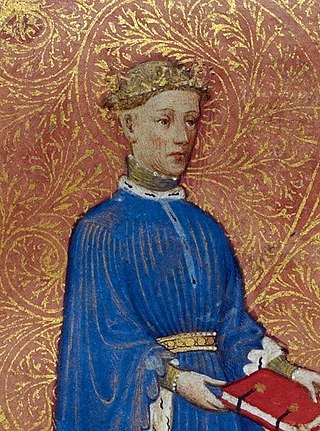
Henry V, also called Henry of Monmouth, was King of England from 1413 until his death in 1422. Despite his relatively short reign, Henry's outstanding military successes in the Hundred Years' War against France made England one of the strongest military powers in Europe. Immortalised in Shakespeare's "Henriad" plays, Henry is known and celebrated as one of the greatest warrior-kings of medieval England.

Henry V is a 1944 British Technicolor epic film adaptation of William Shakespeare's play of the same title. The on-screen title is The Chronicle History of King Henry the Fift with his battell fought at Agincourt in France. It stars Laurence Olivier, who also served as a director. The play was adapted for the screen by Olivier, Dallas Bower, and Alan Dent. The score was composed by William Walton.
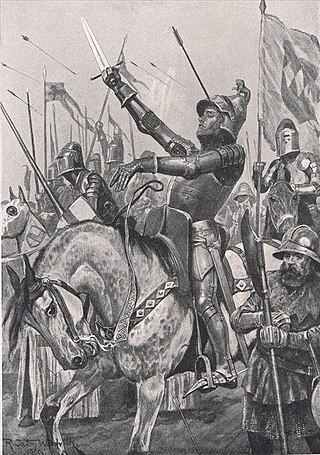
The Battle of Shrewsbury was fought on 21 July 1403, waged between an army led by the Lancastrian King Henry IV and a rebel army led by Henry "Harry Hotspur" Percy from Northumberland. The battle, the first in which English archers fought each other on English soil, reaffirmed the effectiveness of the longbow and ended the Percy challenge to King Henry IV of England.
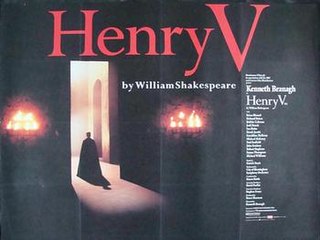
Henry V is a 1989 British historical drama film written and directed by Kenneth Branagh in his feature directorial debut, based on William Shakespeare's history play of the same name. It stars Branagh in the title role of King Henry V of England, with Paul Scofield, Derek Jacobi, Ian Holm, Brian Blessed, Emma Thompson, Alec McCowen, Judi Dench, Robbie Coltrane, and Christian Bale in supporting roles.
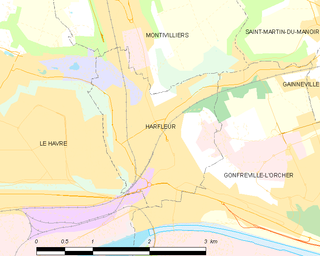
The Siege of Harfleur was conducted by the English army of King Henry V in Normandy, France, during the Hundred Years' War. The defenders of Harfleur surrendered to the English on terms and were treated as prisoners of war. It was the first time that an English army made significant use of gunpowder artillery in the siege of a large urban settlement.

Sir Roger Williams was a Welsh soldier of fortune and military theorist, who served the Protestant cause, fighting against the Spanish in several theatres of war. Robert Dudley, 1st Earl of Leicester said that as a soldier he was "worth his weight in gold". He was later a close associate of Robert Devereux, 2nd Earl of Essex, and became a national hero because of his exploits fighting the Catholic League. He has been described as "an obstreperous, opinionated Welsh soldier" who was "Essex's devoted confederate and agent".

Sir Thomas Erpingham was an English soldier and administrator who loyally served three generations of the House of Lancaster, including Henry IV and Henry V, and whose military career spanned four decades. After the Lancastrian usurpation of the English throne in 1399, his career in their service was transformed as he rose to national prominence, and through his access to royal patronage he acquired great wealth and influence.

Dafydd ap Llewelyn ap Hywel, better known as Dafydd Gam, anglicized to David or Davy Gam, was a Welsh warrior, a prominent opponent of Owain Glyndŵr. He died at the Battle of Agincourt fighting for Henry V, King of England in that victory against the French.

Ancient Pistol is a swaggering soldier who appears in three plays by William Shakespeare. Although full of grandiose boasts about his prowess, he is essentially a coward. The character is introduced in Henry IV, Part 2, and reappears in The Merry Wives of Windsor and Henry V.

Saint Crispin's Day, or the Feast of Saint Crispin, falls on 25 October and is the feast day of the Christian saints Crispin and Crispinian, twins who were martyred c. 286. They are both the patron saints of cobblers, leather workers, tanners, saddlers and glove, lace and shoemakers.
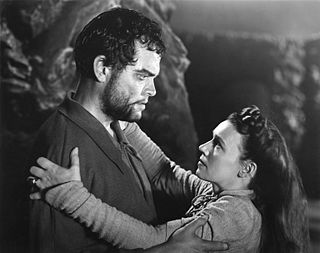
Lord Macbeth, the Thane of Glamis and quickly the Thane of Cawdor, is the title character and main protagonist in William Shakespeare's Macbeth. The character is loosely based on the historical king Macbeth of Scotland and is derived largely from the account in Holinshed's Chronicles (1577), a compilation of British history.

Fluellen is a fictional character in the play Henry V by William Shakespeare. Fluellen is a Welsh Captain, a leader of a contingent of troops in the small army of King Henry V of England while on campaign in France during the Hundred Years' War. He is a comic figure, whose characterisation draws on stereotypes of the Welsh at that time, but he is also portrayed as a loyal, brave and dedicated soldier.

The Famous Victories of Henry the fifth: Containing the Honourable Battel of Agin-court: As it was plaide by the Queenes Maiesties Players, is an anonymous Elizabethan play, which is generally thought to be a source for Shakespeare's Henriad. It was entered by printer Thomas Creede in the Stationers' Register in 1594, but the earliest known edition is from 1598. A second quarto was published in 1617.
"Henry V" is fourth episode of the first series of the British television series The Hollow Crown, based on the play of the same name by William Shakespeare. The episode was produced by Rupert Ryle-Hodges, directed by Thea Sharrock and starred Tom Hiddleston as Henry V of England. It was first broadcast on 21 July 2012 on BBC Two.

An Age of Kings is a fifteen-part serial adaptation of the eight sequential history plays of William Shakespeare, produced and broadcast in Britain by the BBC in 1960. The United States broadcast of the series the following year was hosted by University of Southern California professor Frank Baxter, who provided an introduction for each episode specifically tailored for the American audience. At the time, the show was the most ambitious Shakespearean television adaptation ever made, and was a critical and commercial success in both the UK and the US. Performed live, all episodes were telerecorded during their original broadcast.
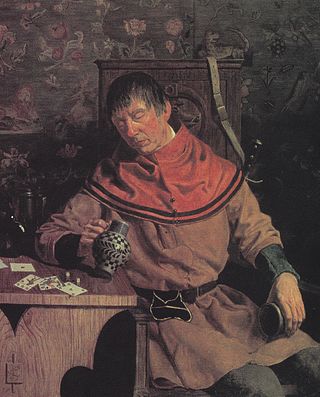
Bardolph is a fictional character who appears in four plays by William Shakespeare. He is a thief who forms part of the entourage of Sir John Falstaff. His grossly inflamed nose and constantly flushed, carbuncle-covered face is a repeated subject for Falstaff's and Prince Hal's comic insults and word-play. Though his role in each play is minor, he often adds comic relief, and helps illustrate the personality change in Henry from Prince to King.


















